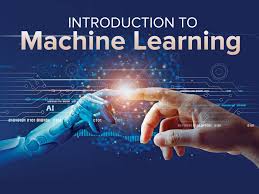
An Introduction to Machine Learning: Unveiling the Power of AI
Machine Learning: A Beginner’s Guide
Machine learning is a branch of artificial intelligence that enables computers to learn and improve from experience without being explicitly programmed. In simple terms, it is the science of getting computers to act without being explicitly programmed.
At the core of machine learning are algorithms that can learn from and make predictions or decisions based on data. These algorithms are designed to identify patterns in data and use them to make informed decisions or predictions.
Types of Machine Learning
There are three main types of machine learning:
- Supervised Learning: This type of learning involves training a model on a labelled dataset, where the model learns to map input data to the correct output.
- Unsupervised Learning: In unsupervised learning, the model is trained on unlabelled data and must find patterns or relationships in the data on its own.
- Reinforcement Learning: Reinforcement learning involves training an agent to make sequential decisions by rewarding or punishing it based on its actions.
Applications of Machine Learning
Machine learning has a wide range of applications across various industries, including:
- Predictive analytics
- Natural language processing
- Image recognition
- Fraud detection
- Recommendation systems
The Future of Machine Learning
The field of machine learning is constantly evolving, with new algorithms and techniques being developed to tackle increasingly complex problems. As technology continues to advance, machine learning is expected to play a crucial role in shaping the future of various industries.
If you’re interested in exploring the world of artificial intelligence and unlocking the potential of machine learning, there’s never been a better time to start your journey into this exciting field!
Top 5 Tips for Beginners in Machine Learning: A Comprehensive Introduction
- Start by understanding the basic concepts of machine learning such as supervised learning, unsupervised learning, and reinforcement learning.
- Familiarise yourself with popular machine learning algorithms like linear regression, decision trees, and neural networks.
- Practice coding in languages commonly used for machine learning such as Python and R.
- Explore online courses and tutorials to deepen your knowledge and skills in machine learning.
- Join machine learning communities or forums to engage with others in the field and stay updated on the latest trends.
Start by understanding the basic concepts of machine learning such as supervised learning, unsupervised learning, and reinforcement learning.
To embark on your journey into the realm of machine learning, it is essential to begin by grasping the fundamental concepts that underpin this field. Familiarising yourself with key concepts such as supervised learning, unsupervised learning, and reinforcement learning will provide a solid foundation for further exploration and understanding of the intricacies of machine learning algorithms. By delving into these core principles, you can gain valuable insights into how data is processed, patterns are identified, and decisions are made within the realm of artificial intelligence.
Familiarise yourself with popular machine learning algorithms like linear regression, decision trees, and neural networks.
To embark on your journey into the realm of machine learning, it is crucial to acquaint yourself with popular algorithms such as linear regression, decision trees, and neural networks. These fundamental algorithms form the backbone of machine learning and are essential tools for understanding and implementing predictive models. By familiarising yourself with these algorithms, you will gain valuable insights into how data is analysed, patterns are identified, and predictions are made in the exciting world of artificial intelligence.
Practice coding in languages commonly used for machine learning such as Python and R.
Practising coding in languages commonly used for machine learning, such as Python and R, is an essential step for anyone looking to delve into this field. Python, with its simple syntax and a vast array of libraries like TensorFlow, Keras, and Scikit-learn, has become the go-to language for machine learning enthusiasts and professionals alike. Its versatility allows users to build and deploy models efficiently. R, on the other hand, is renowned for its statistical analysis capabilities and is widely used in data analysis and visualisation tasks. By gaining proficiency in these languages, individuals can effectively implement algorithms, manipulate data sets, and gain insights from complex data structures. Regular practice not only enhances coding skills but also deepens one’s understanding of machine learning concepts and techniques.
Explore online courses and tutorials to deepen your knowledge and skills in machine learning.
To deepen your understanding and enhance your skills in machine learning, consider exploring online courses and tutorials. These resources offer a structured approach to learning, providing you with access to expert knowledge and practical exercises that can help you grasp the fundamentals of machine learning and advance your proficiency in this field. By engaging with online courses and tutorials, you can gain valuable insights, learn new techniques, and stay updated on the latest developments in machine learning, empowering you to excel in this dynamic and rapidly evolving domain.
Join machine learning communities or forums to engage with others in the field and stay updated on the latest trends.
To deepen your understanding of machine learning and stay abreast of the latest trends in the field, consider joining machine learning communities or forums. Engaging with like-minded individuals allows you to exchange knowledge, seek advice, and stay updated on cutting-edge developments in the ever-evolving world of artificial intelligence. By participating in these communities, you can expand your network, gain valuable insights, and foster meaningful connections with professionals who share your passion for machine learning.
